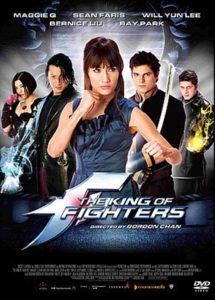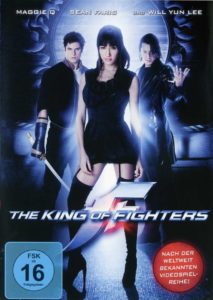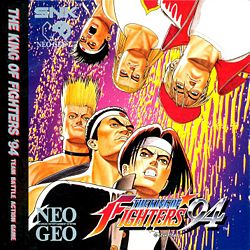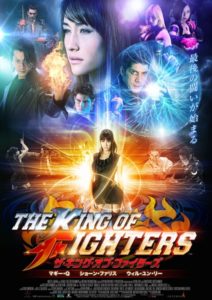The King of Fighters
拳皇
Japan/Taiwan/US/Germany, 2010, colour, 1.85:1, 90 mins.
Director: Chen Jiashang 陈嘉上 [Gordon Chan].
Rating: 4/10.
Wishy-washy but just about watchable action nonsense inspired by the Japanese videogame.
Boston, US, the present day. Shiranui Mai (Maggie Q) is one of a select group of people who, via a special bluetooth earset, are “called in” to another dimension to take part in a series of fights that will decide The King of Fighters. The tournament is made possible by the ancient Treasures of the Clans (a necklace, mirror and sword) which unlock the way into the alternative dimension. When their owner, Iwata Takao (Haraguchi Toshi), displays them for the first time in a museum, they are stolen by Rugal Bernstein (Ray Park), who uses them to free the Orochi demon and, by submitting to it, gain unlimited power. In the struggle, Kagura Chizuru (Ye Fanghua), whose father updated  the Treasures of the Clans’ technology, is wounded, but reveals that the sword in the exhibition was a fake. She tells Mai to find Kusanagi Saisyu (Kanagawa Hiro), owner of the real sword, so Rugal can be stopped. Along with CIA agent Terry Bogard (David Leitch) and her fiance Yagami Iori (Will Yun Lee), a retired King of Fighters, Mai finds Kusanagi, who is dying in hospital. She convinces his son, Ryo (Sean Faris), “the last of the Kusanagis”, to join her in the battle against Rugal, whose power is growing to such an extent that he is close to merging the two dimensions. Meanwhile, Rugal has recruited lesbian lovers Vice (Liao Bi’er) and Mature (Monique Ganderton) as his sidekicks in the other dimension.
the Treasures of the Clans’ technology, is wounded, but reveals that the sword in the exhibition was a fake. She tells Mai to find Kusanagi Saisyu (Kanagawa Hiro), owner of the real sword, so Rugal can be stopped. Along with CIA agent Terry Bogard (David Leitch) and her fiance Yagami Iori (Will Yun Lee), a retired King of Fighters, Mai finds Kusanagi, who is dying in hospital. She convinces his son, Ryo (Sean Faris), “the last of the Kusanagis”, to join her in the battle against Rugal, whose power is growing to such an extent that he is close to merging the two dimensions. Meanwhile, Rugal has recruited lesbian lovers Vice (Liao Bi’er) and Mature (Monique Ganderton) as his sidekicks in the other dimension.
REVIEW
 Shot in Canada with international money, The King of Fighters is no worse, but also no better, than many other movies based on videogames, proving – since the first such exercise, Super Mario Bros. (1993) – that the quality of these adaptations has everything to do with the filmmakers and nothing to do with the original games. Based on the videogame series The King of Fighters ザ·キング·オブ·ファイターズ (published by Japan’s SNK Playmore since 1994), the film is a notch below Street Fighter: The Ultimate Battle (1994) and the Mortal Kombat series (1995-97, which dispensed with scripts in favour of a succession of fights) and many notches below real movies like the Resident Evil (2002-16) or Lara Croft (2001-03) ones which simply took the original games as a starting point. But it’s not unwatchable. The main problem is that The King of Fighters 拳皇 tries to have it both ways. It fiddles with the originals by making Ryo a white American, dressing Mai in a French-maid outfit rather than a breast-bouncing oriental dress, and changing Bogard to a CIA agent (all, presumably, to pander to US audiences’ tastes) and thus enrages fans of the games; but it also tries to cram in as much fighting between dull exposition.
Shot in Canada with international money, The King of Fighters is no worse, but also no better, than many other movies based on videogames, proving – since the first such exercise, Super Mario Bros. (1993) – that the quality of these adaptations has everything to do with the filmmakers and nothing to do with the original games. Based on the videogame series The King of Fighters ザ·キング·オブ·ファイターズ (published by Japan’s SNK Playmore since 1994), the film is a notch below Street Fighter: The Ultimate Battle (1994) and the Mortal Kombat series (1995-97, which dispensed with scripts in favour of a succession of fights) and many notches below real movies like the Resident Evil (2002-16) or Lara Croft (2001-03) ones which simply took the original games as a starting point. But it’s not unwatchable. The main problem is that The King of Fighters 拳皇 tries to have it both ways. It fiddles with the originals by making Ryo a white American, dressing Mai in a French-maid outfit rather than a breast-bouncing oriental dress, and changing Bogard to a CIA agent (all, presumably, to pander to US audiences’ tastes) and thus enrages fans of the games; but it also tries to cram in as much fighting between dull exposition.
 The result, under the supervision of Hong Kong director Chen Jiashang 陈嘉上 [Gordon Chan] and with an original story that uses elements from the early games (see first one, left), is kind of wishy-washy. The final half-hour is continuous fighting, reasonably but not memorably arranged by American stuntman/actor David Leitch (who also takes on the lightly comic role of Bogard), and with okay visual and special effects. The casting is another matter: without clever direction (as she got in Naked Weapon 赤裸特工, 2002, and Mission: Impossible III, 2006), Hawaiian model-turned-actress Maggie Q is hardly convincing here as a powerful super-fighter, and Canadian actresses Liao Bi’er 廖碧儿 [Bernice Liu] and Monique Ganderton likewise as a teasy pair of lesbian fighters. As the doubting American youth in the middle, Sean Faris is on a par with – and just as annoying as – Ralph Macchio in The Karate Kid (1984), while Korean American actor/martial artist Will Yun Lee doesn’t get much chance to showcase his skills. French-Canadian actress Ye Fanghua 叶芳华 [Françoise Yip] brings some mature class to her supporting role, but it’s Scottish actor/martial artist Ray Park – his face for once clearly visible on screen – who brings a welcome sense of humour to the role of the super-villain.
The result, under the supervision of Hong Kong director Chen Jiashang 陈嘉上 [Gordon Chan] and with an original story that uses elements from the early games (see first one, left), is kind of wishy-washy. The final half-hour is continuous fighting, reasonably but not memorably arranged by American stuntman/actor David Leitch (who also takes on the lightly comic role of Bogard), and with okay visual and special effects. The casting is another matter: without clever direction (as she got in Naked Weapon 赤裸特工, 2002, and Mission: Impossible III, 2006), Hawaiian model-turned-actress Maggie Q is hardly convincing here as a powerful super-fighter, and Canadian actresses Liao Bi’er 廖碧儿 [Bernice Liu] and Monique Ganderton likewise as a teasy pair of lesbian fighters. As the doubting American youth in the middle, Sean Faris is on a par with – and just as annoying as – Ralph Macchio in The Karate Kid (1984), while Korean American actor/martial artist Will Yun Lee doesn’t get much chance to showcase his skills. French-Canadian actress Ye Fanghua 叶芳华 [Françoise Yip] brings some mature class to her supporting role, but it’s Scottish actor/martial artist Ray Park – his face for once clearly visible on screen – who brings a welcome sense of humour to the role of the super-villain.
CREDITS
Produced by Micott & Basara (JP), Double Edge Entertainment (TW), Inferno International (US), VIP Medienfonds 4 (Germany).
Script: Rita Augustine, Matthew Ryan Fischer. Original story: Rita Augustine, Zhou Sun [Chris Chow]. Photography: Huang Yuetai [Arthur Wong]. Editing: Chen Qihe [Chan Ki-hop]. Music: Takahashi Tetsuya. Music supervision: Liz Gallacher. Production design: Jill Scott. Art direction: Eija Johnson. Costume design: Sheila White. Sound: Shane Connelly, Jeffrey Alan Jones. Action: David Leitch, Larry Lam. Visual effects: Ron Simonson. Special effects: Al Benjamin.
Cast: Maggie Q (Shiranui Mai), Sean Faris (Kusanagi Kyo), Will Yun Lee (Yagami Iori), Ray Park (Rugal Bernstein), David Leitch (Terry Bogard, lead CIA agent), Ye Fanghua [Françoise Yip] (Kagura Chizuru), Kanagawa Hiro (Kusanagi Saisyu), Liao Bi’er [Bernice Liu] (Vice), Monique Ganderton (Mature), Doug Abrahams (Mick O’Meara), Candus Churchill (Berta, nurse), Robin Nielsen (junior CIA agent), Scott Patey (Scott Hana), Haraguchi Toshi (Iwata Takao), Samuel Hargrave (Sam/Mr. Big, Shiranui Mai’s opening opponent), Keanu Lam (young Kyo), Mike Dopud (CIA agent).
Release: Japan, 2 Jul 2011; Taiwan, tba; US, 7 Sep 2010 (DVD); Germany, 25 Feb 2011 (DVD).
(Review originally published on Film Business Asia, 25 Oct 2010.)
